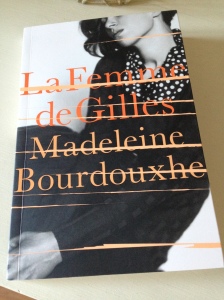I have written before about Georges Simenon, the prolific Belgian writer with a talent for illuminating the dark side of the human psyche with all its inherent complexities. This is another of his romans durs or ‘hard’, psychological novels. An intoxicating tale of passion and obsession in which the past and present are blended together to great effect – it might just be my favourite Simenon to date.
As the novella opens, we are dropped into a conversation between two lovers, Tony and Andrée, cloistered together in a hotel room in Triant, a small-town community in rural France. It is clear that the couple have just finished making love, a violent, passionate ritual that occurs in secret each month – always at the same hotel (owned by Tony’s brother), always in the blue room of the novella’s title.
Both parties are married but not to one another. Tony – a handsome, virile self-made man who owns an agricultural machinery business – is married to Gisèle, the perfect wife and mother to the couple’s daughter, Marianne. Andrée, on the other hand, is a more complex character than her lover. A passionate, manipulative woman at heart, she is married to Nicolas, a wealthy man of failing health whose formidable mother owns the local grocery store.
As the pair relax after their lovemaking, Andrée begins to ask Tony a series of seemingly innocent questions about his feelings for her, speculating about the future as one might do in this type of situation. However, little does Tony know of the significance of this conversation or the importance Andrée chooses to attach to Tony’s answers in the dreamlike atmosphere of the moment. As we soon learn, it is a scene that Tony must revisit in his mind time and time again as the story unfolds…
[Andrée:] ‘Could you spend your whole life with me?’
He had hardly noticed her words; they were like the images and odours all around him. How could he have guessed that this scene was something he would relive ten times, twenty times and more – and every time in a different frame of mind, from a different angle? (p.5)
[…]
[Andrée] ‘Would you like to spend your whole life with me?’
[Tony] ‘Sure.’
He had said that, he did not deny it. He was the one who had reported that conversation to the magistrate. But the important thing was his tone of voice. He was just talking, without meaning anything by it. It wasn’t real. In the blue room, nothing was real. Or rather, its reality was of a different nature, incomprehensible anywhere else. (p.64)
From a very early stage in the novella (p. 5), it becomes abundantly clear that in the present moment, Tony is being questioned concerning an investigation linked to his liaison with Andrée. The opening scene at the hotel has already happened; it is in the past, and Tony is being forced to revisit it through a series of interrogations by magistrates, psychologists and other members of the judicial team.
One of the most compelling things about this novella is the way Simenon seamlessly blends elements of the present-day investigations and recollections of past events in a way that makes the overall narrative feel so compelling. The focus here is very much on the psychological – in other words, Tony’s state of mind as he worries away at each development and conversation, repeatedly turning them over in his mind. As a consequence, the interrogations never feel in the least bit dry as they flow naturally within the framework of the story, sketching the details of the characters’ motivations and movements on the days in question.
What starts as a passionate, sensual novella becomes increasingly tense as the narrative unfolds. Simenon is adept at revealing just the right amount of information at each stage – enough to keep the reader guessing about the exact nature of the crime(s) and Tony’s involvement in crucial events virtually to the very end.
This is a very cleverly constructed story with complex, interesting characters at its heart. Andrée is a particularly intriguing individual. Considered aloof and distant by Nicolas in the past – he has known her since childhood – she is, in fact, forceful and manipulative at heart. It was Andrée who initiated the affair with Tony during a chance meeting by the roadside one evening the previous year.
In fact, it was she who had possessed him, and her eyes had gleamed with as much triumph as passion. (p. 22)
In addition to the tension and passion, the atmosphere of village life in rural France is also beautifully evoked; from the sights and landmarks of the countryside to the sounds outside the window during the couple’s illicit trysts at the hotel. There are echoes of another Simenon, too – The Krull House, which focuses on a community’s resentment of immigrants and the havoc this can wreak. Tony is considered something of an outsider in the community; his parents having come from Italy to settle in the region. In his youth, Tony left the village to find employment elsewhere, only to return ten years later to set up his business in the locality. Both of these points work against him in the eyes of the community.
In summary, this is a taut, uncompromising novella on the dangers of seemingly casual affairs. An utterly compelling book that grips the reader from its intriguing opening chapter. I loved it – very highly recommended indeed.
The Blue Room is published by Penguin Books; personal copy.





